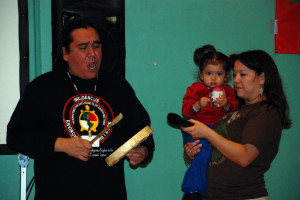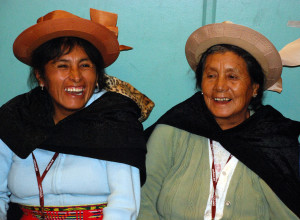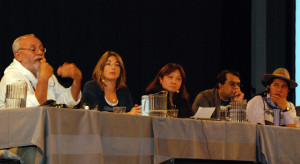Photo essay of the 12 December March in Copenhagen continues after this blog post
Copenhagen Day of Action on Climate Change:
Energy in the Streets; Disappointment in the Negotiations
Late last night a draft text on the Reducing Emissions from Deforestation and Forest Degradation (REDD) scheme was released. It was strongly condemned by NGOs from around the world. The text of this agreement gave mere lip service to Indigenous Peoples’ Rights and to safeguards against conversion of native forests to timber plantations, not including them in the legally binding body, but rather referring to them in a preamble.
This was no surprise to those of us who have been following REDD since it was formally announced at the UN Climate Conference in Bali, Indonesia in 2007. It was clear then that this was a bunch of greenwash aimed at enriching the world’s most notorious deforesters, while providing the impetus for a massive global land grab directed at the world’s remaining forested lands—most of which are in the territories of Indigenous Peoples.
Thus we were not shocked when, at the Climate Conference last year in Poznan, all references to Indigenous Rights and the UN Declaration on the Rights of Indigenous Peoples were struck from the text by the gang of four: the U.S., Canada, Australia and New Zealand—who always seem to be the bad guys in these UN negotiations.
Nonetheless, for those of us who have been fighting to stop the rampant destruction of native forests for so many years, the total corruption of an agreement to ostensibly curb deforestation is a major kick in the gut.
So it was with REDD in mind that we joined the massive show of people rallying for real and effective action on climate change at Parliament Square in Copenhagen earlier this afternoon.
March organizers estimated the swarming crowd at 100,000. The police said 50,000. The reality being somewhere in the middle, it was certainly the largest protest against climate change ever to have taken place. And when coupled with the marches and protests in more than 100 other countries around the world, it was massive indeed.
Orin and I can attest to the impressive crowd as we crossed through it en route to find our allies in the “system change not climate change” bloc, on the exact opposite side of the square. After 15 or so minutes of squeezing through the crush of the crowd, we managed to find our way to the coffee cart where several of our friends were waiting in an impossible queue for something warm to drink. After waiting for what seemed like forever, with coffees finally in hand, we and our friends made our way in the direction of the “system change not climate change” sound trucks, which were to lead the bloc, but not before one of our German comrades warmed everyone’s coffee with a dollop of whiskey. “To help warm you up on the inside,” he explained.
Another U.S.-based colleague and I remarked that we had certainly never experienced THAT before at a U.S. protest!
We found the Climate Justice Now! bloc with our allies, and ran into Melissa, a woman we had met fifteen years before during the struggle to save the ancient redwoods in California. She had worked with Judi Bari, our friend and colleague who had been blown up by a pipe bomb in 1990 for trying to stop the rampant logging of some of the oldest and most majestic trees on the planet—the 100 meter tall, 2,000 year old redwoods, being felled for hot tubs and outdoor furniture. Melissa was passing out stickers that elicited naughty giggles in nearly everyone who read them. They read “fck, fck, fck the system,”—a direct response to the very mainstream “tck, tck tck” campaign initiated by some of the larger NGOs.
The march consisted of numerous blocs, spread out over several kilometers. Orin and I made our way to the very beginning of the march, where the Indigenous Peoples’ delegation was leading the way. Orin photographed their delegation and we then gravitated to the side where we documented each bloc as it passed, waiting for our allies with the System Change bloc. The images he captured during the hour or more that the march flowed by are captured in the photo essay included here.
After an interminably long time, toward the end of the march we finally spied the sound trucks with the green banners that signified the beginning of the System Change bloc. We connected with some of our allies and photographed them moving by. After they had passed we walked toward the back of the bloc to see what else we could find, and just as we did, a mass of police vans moved in and blocked the street, cutting off a section of the march. Another cluster of police vans cut them off from the back. We tried to move in to take photos of the situation and document the preemptive roundup, but were roughly shoved back by police who quickly taped off the area. We watched the stand off for 40 minutes or so, alerting some of our allies to the alarming situation.
Hundreds of march participants flooded back to the scene of the round up, and we could here pounding drums along with the chant, “Let them go! Let them go!” echoing through the corridor of tall brick Danish buildings. They were not let go, and at last report, an estimated 700 had been arrested.
We unfortunately had to leave before the conclusion of the standoff because Orin had lost his official UN press credentials somewhere in the crush of people. Without them he would be unable to participate in the protests and other events planned inside the Bella Centre in the coming week. So we needed to get them replaced before the registration desk closed for the night. We found a running metro that delivered us to the Bella Centre. We managed to avoid the incredibly long line of unaccredited people shivering in the frigid Danish air through some evasive action that took us inside to the press accreditation line and resulted in Orin procuring a new badge in record time.
In the security line for the metal detectors, we bumped into another colleague who recounted to us her experience with nearly getting nabbed in the roundup. She told us she sensed something was up and literally ran ahead, just missing the advance of the police vans. She continued with the march, she told us, to the very end at the Bella Centre, but was prevented from entering the UN premises, even with her accreditation badge, because she was with the march. “So I climbed the fence,” she told us. “I was just too cold to wait any longer.”
So much for their security…
The metro ride back toward the hotel was hellish. The metro arrived at the Bella Center stop already crowded. We and about four others managed to smash ourselves on, thinking not one more person could possibly fit. We were proved wrong about 2 stops down where another half dozen people forced their way into our end of the car. By the time we got to the Christianshavn stop, we couldn’t stand it anymore and retreated to the street to find a bus. This stop was only a few blocks from where we had stood when the black bloc had been surrounded, and the police lights were still blazing. Realizing quickly that this meant no buses were to come, we waved down a cab and zoomed back to the hotel to sit down, finally, warm up and to complete our computer work for the day.
This is not the last, but the first big action this week. Tomorrow there is an action planned which intends to shut down the Copenhagen port, to call attention to the massive greenhouse gas emissions caused by the shipping industry. Nearly every day next week some action is planned and will reach a crescendo with the “Reclaim Power” action on Wednesday—the day that the high level ministers arrive—which is intended to occur both on the inside of the Bella Centre, as well as on the outside, with both sides to meet for a “Peoples’ Assembly” to discuss real and just solutions to the climate crisis.
The big challenge of that day is the fact that the UN Climate Secretariat has announced that they are severely restricting the access of NGOs to the Bella Centre—only allowing access to a privileged handful of “observers.”
Some of us believe that this signals the end of the UN Climate process. It has truly become the World Carbon Trade Organization and is behaving as such through meetings behind closed doors and absolute restriction of participation to only those chosen few, and their complicit, bleating, sheep-like media.
Now it is time for the people of the world who want to stop the oncoming train of climate catastrophe to stand up and “Reclaim Power.” We will be reporting from the Reclaim Power protests in Copenhagen this coming Wednesday.
Wish us luck.
Reporting from the streets of Copenhagen,
Anne Petermann, Executive Director, Global Justice Ecology Project
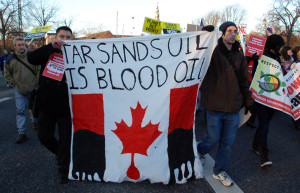
Indigenous Peoples led the march of an estimated 50,00 to 100,000. Photo: Langelle/GJEP-GFC
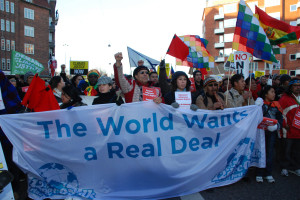
Photo: Langelle/GJEP-GFC
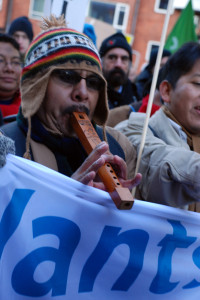
Photo: Langelle/GJEP-GFC
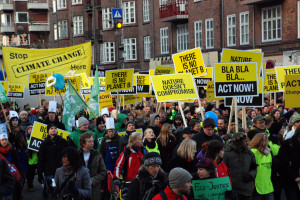
Photo: Langelle/GJEP-GFC
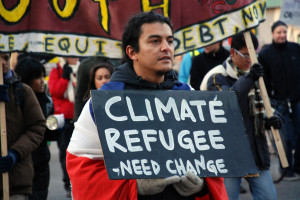
Photo: Langelle/GJEP-GFC
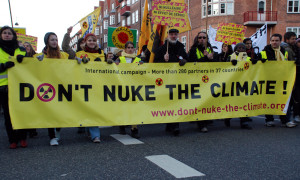
Photo: Langelle/GJEP-GFC
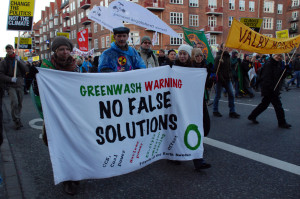
Photo: Langelle/GJEP-GFC
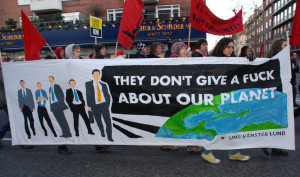
Photo: Langelle/GJEP-GFC
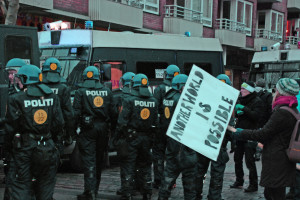
Photo: Langelle/GJEP-GFC





















